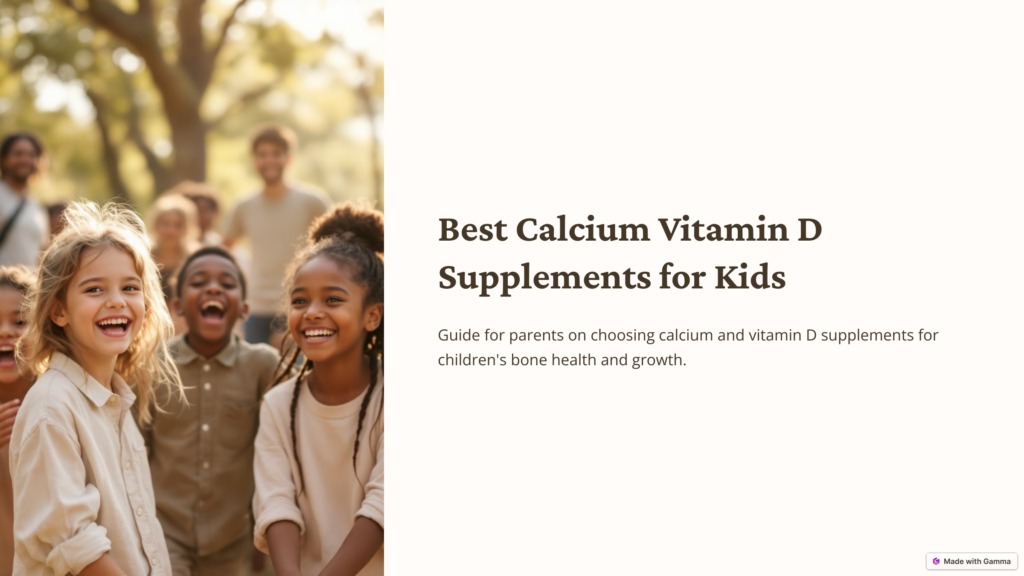Calcium Vitamin D Supplements for Kids
🔎 Why Calcium and Vitamin D Matter
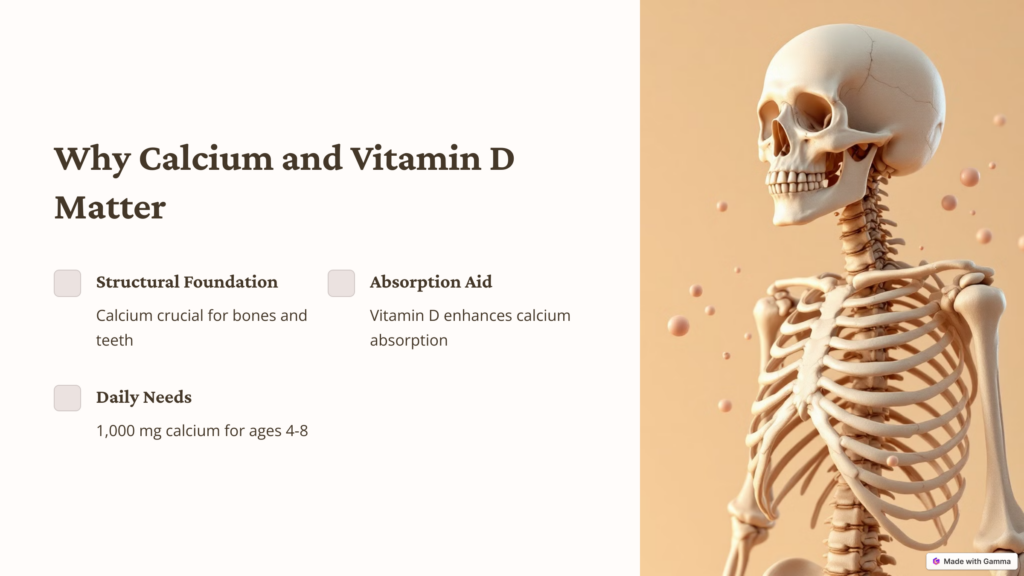
💊 Key Factors in Choosing Best Calcium Vitamin D Supplements for Kids
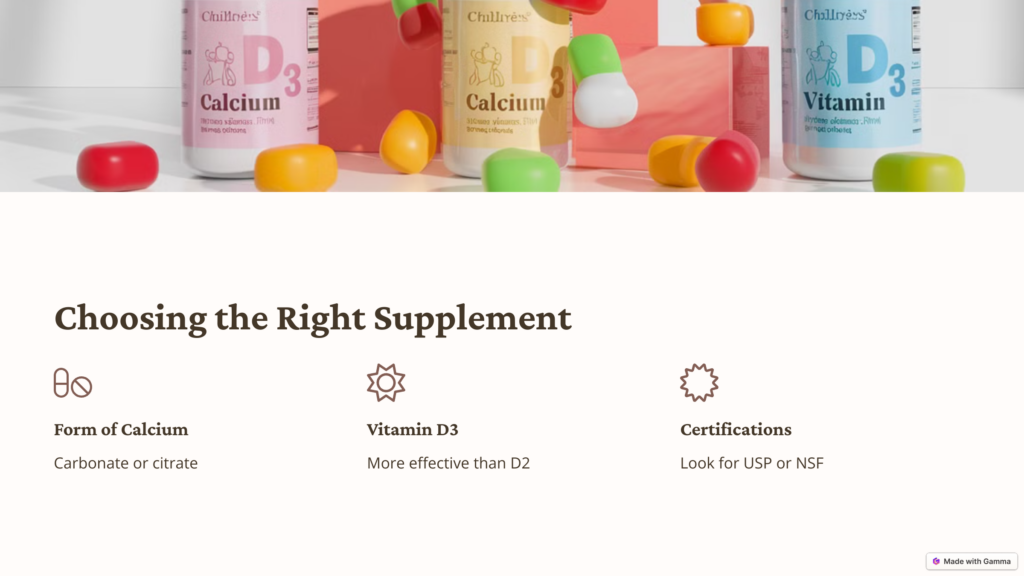
- Form of Calcium: Common forms include calcium carbonate (cost-effective, higher elemental calcium) and calcium citrate (easier on digestion). Check which one suits your child.
- Vitamin D3 (cholecalciferol): Widely considered more effective for raising vitamin D levels in the body compared to D2.
- Age-Appropriate Dosage: Most children’s supplements provide a dosage aligned with pediatric guidelines. Always read the label carefully to avoid over-supplementation.
- Certifications and Quality Assurance: Look for third-party testing labels, such as USP or NSF, ensuring your supplement contains what it promises.
- Flavor and Format: Gummy, chewable tablet, liquid drop, or effervescent powder—pick the type that most appeals to your child. My kids love gummies, but I keep an eye on sugar content.
When I first began exploring calcium and vitamin D products, I realized the variety can be overwhelming. Some are purely calcium-focused, while others combine multiple vitamins and minerals. If your child has additional needs, such as vitamin K or magnesium, look for a comprehensive formula. However, be cautious of overloading on unnecessary ingredients. Simpler can be better if you already have a balanced diet in place.
⚠️ Signs Your Child May Need Extra Support
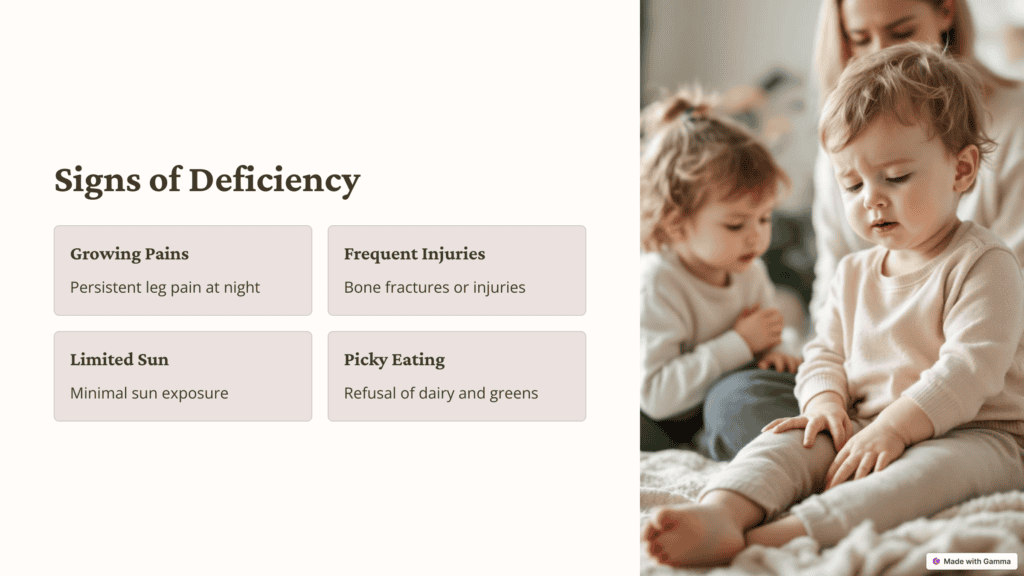
- Persistent leg or “growing pains” at night
- Frequent bone injuries or fractures
- Minimal sun exposure (especially in colder, darker climates)
- Picky eaters who refuse dairy and leafy greens
Now, these signs aren’t diagnostic, and you should always consult your pediatrician for personalized advice. But from my experience, noticing these hints in my own children prompted me to check their dietary intake more carefully. After adjusting their diet and adding a high-quality supplement, we saw improvements in overall mood and energy. It’s not a one-size-fits-all solution, of course, but it’s worth investigating if you see consistent issues in your child’s nutrition.
📝 Practical Dosage Tips(Calcium vitamin D Supplements for Kids)
Each child is unique, and you’ll find different dosage recommendations across various products. Typically, supplements aimed at kids provide around 200–600 mg of calcium and 400–600 IU (10–15 micrograms) of vitamin D per serving, depending on age. Don’t hesitate to ask your pediatrician or a qualified nutritionist about the right amount for your child. Click here to refer to the paper on calcium vitamin D intakes in children.
It’s also important to space out calcium if you’re giving multiple doses per day. The body absorbs calcium more effectively in smaller, divided doses than in one large dose. If your child struggles with large pills, try chewable or gummy forms, but be mindful of added sugars and preservatives.
🍴 Whole Foods Still Matter
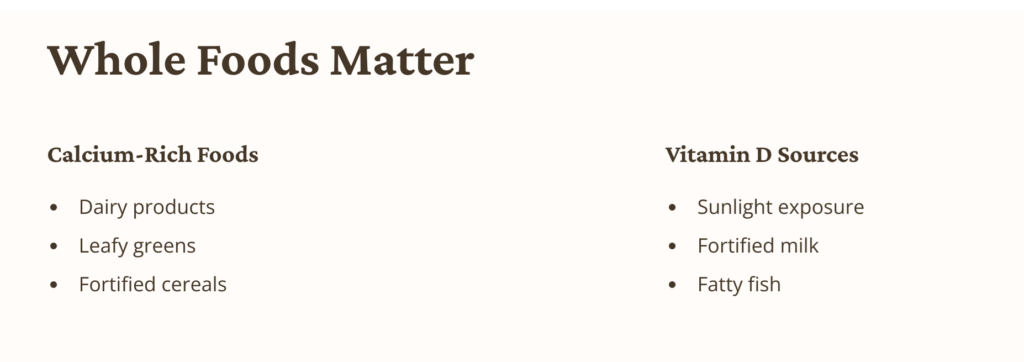
While supplements are a great fallback, whole foods remain the gold standard. Dairy products (milk, yogurt, cheese) are well-known for high calcium content. Leafy greens like kale and spinach add some variety. Many cereals, juices, and plant-based milks are fortified with both calcium and vitamin D. Consider building meals that naturally include these elements before relying solely on a supplement.
Vitamin D can come from sunlight exposure, but this may vary based on geographic location and skin pigmentation. If your child rarely plays outdoors or you live in a region with limited sunlight, supplementation becomes more important. Just don’t forget to apply sunscreen when they do spend time outside!
🏁 Conclusion: Building Strong Bones with Confidence
Calcium and vitamin D are crucial for your child’s long-term bone health and overall growth. By focusing on quality supplements, sticking to age-appropriate dosages, and continuing to serve nutritious meals, you can ensure that your kids grow up strong and energetic. From my personal perspective as a dad in the pharmaceutical world, it’s about balancing the convenience of supplementation with wholesome, real foods whenever possible.
Ultimately, the best calcium vitamin D supplements for kids are those that fit seamlessly into your family’s lifestyle. Make it fun, keep it consistent, and always check in with healthcare professionals for personalized advice. I hope this guide has been helpful in guiding you through the basics and beyond!

❓ Q&A
Q1. Can my child get enough calcium and vitamin D from diet alone?
A: In theory, yes—especially if they consume dairy or fortified foods and get enough sun exposure. However, picky eaters or certain dietary restrictions can make supplementation a must.
Q2. Should I choose separate supplements for calcium and vitamin D, or a combination?
A: A combination is often more convenient, but separate supplements can be fine if they’re dosed correctly. It truly depends on your child’s specific needs.
Q3. Are gummy supplements as effective as pills or liquids?
A: Generally, gummies can be just as effective, but watch out for sugar and ensure the label indicates the right amounts of calcium and vitamin D. Opt for brands that also do third-party testing.
Q4. Can taking too much calcium or vitamin D be harmful?
A: Over-supplementation can lead to health problems like hypercalcemia. Always stick to recommended daily allowances and consult a professional if unsure.
Q5. What about vegan or lactose-intolerant kids?
A: Plant-based milks, such as soy or almond milk, are often fortified with calcium and vitamin D. You can also find supplements that are free from dairy or other common allergens.

